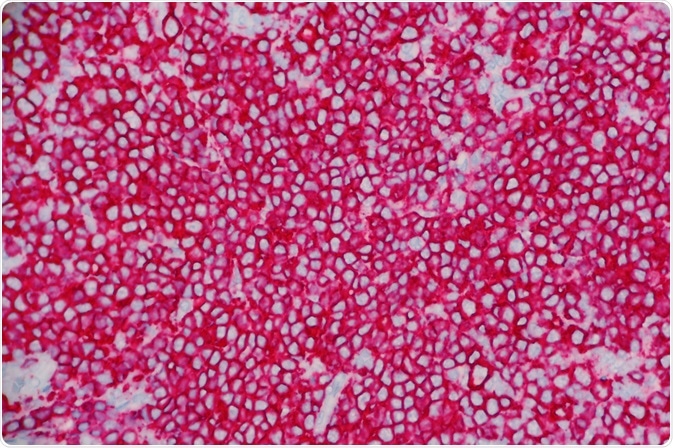A defining characteristic of relapsed or refractory follicular lymphoma (RRFL) is the presence of repeated recurrences and the need for frequent treatments. For this reason, the introduction of new agents offers a greater possibility of prolonged survival, and research into novel treatment agents is an ongoing need. This article summarizes some of the main findings from research of RRFL.

High-grade follicular lymphoma.
Image Credit: Lisa Culton / Shutterstock.com
Rituximab and resistance
Over recent decades, the introduction of the targeted monoclonal antibody medication rituximab has made a significant impact on the prognosis of patients with follicular lymphoma. Research has shown that treatment with rituximab has improved the prognosis to 58% in the 5-year expected survival rate and 43.5% in the 10-year survival rate. As such, it has been the preferred first-line treatment method for many treatments, alongside chemotherapeutic agents such as cyclophosphamide and doxorubicin.
However, there is an increasing prevalence of refractory cases due to resistance to rituximab. The response rates appear to be diminishing over time, with resistance becoming a greater problem.
This change in the efficacy of rituximab has prompted further research into alternative treatment methods for RRFL. However, in order for novel agents to be preferable to rituximab, which already has a substantial body of research with few associated side effects, the new agent must be either more effective than rituximab or more active in the case of resistance to rituximab.
Novel agents
As a result of this data, there has been significant research to investigate the possibility of new agents that may be more effective than rituximab, or useful in cases of resistance.
Other monoclonal antibody medications that have been considered in scientific research include:
- Ofatumumab: This drug binds to an alternative epitope on CD20 and has a similar action to rituximab with poor efficacy for rituximab-resistant patients.
- Ocrelizumab: This is a second-generation anti-CD antibody with encouraging initial evidence for its use in treating RRFL, but is currently on hold due to a high number of opportunistic infection deaths in studies.
- Veltuzumab: This second-generation anti-CD antibody has demonstrated a lower efficacy than rituximab in in vivo trials.
- Obinutuzumab: This glycosylated monoclonal antibody has demonstrated promising activity as a single agent.
- Epratuzumab: This humanized anti-CD22 is associated with promising evidence as a potential therapy for RRFL.
- Galiximab: This chimeric anti-CD80 shows potential for combined treatment with rituximab.
- Mogamulizumab: This humanized antibody targets the CCR4 chemokine receptor with significant efficacy. However, there remains some concern about severe side effects, such as Steven-Johnson syndrome.
Other areas that may be targeted by the drug include the cell surface, intracellular pathways, and the microenvironment of the tumor. AKT inhibitors, BTK inhibitors, mTOR inhibitors, and Syk inhibitors are novel therapies that target the phosphatidylinositol 3-kinase pathway. Bcl-2 inhibitors, HDAC inhibitors, vorinostat, and romidepsin, have also been studied.
Radioimmunotherapy is also a promising avenue, as this treatment approach would utilize the action of the targeted antibodies to deliver radioactive isotopes to the site of the tumor. Research has supported the safety and efficacy of I-tositumomab and Y-ibritumomabtiutexan to allow for their approval for use in the United States.
The chemotherapeutic agent bortezomib has modest activity as a single agent and does not appear to be significantly more effective when combined with targeted therapy such as rituximab. Additionally, the combination is associated with more severe side effects. Taken together, the research suggests that the risks outweigh the benefits in most cases.
References
Further Reading
Last Updated: Apr 21, 2021